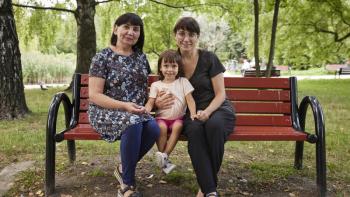
Building Homes and Hope: Three Years of Resilience in Ukraine
Current housing crisis in Ukraine
Current housing crisis in Ukraine
The full-scale war which started in February 2022 has left scars on Ukraine, not only on the land but in the hearts of millions. Streets once filled with the laughter of children now stand in silence, overshadowed by the rubble of destroyed homes. What was once a personal tragedy for some has become a national housing crisis – the largest since Ukraine’s independence – with millions of people displaced and forced to seek shelter in overcrowded apartments or temporary accommodation, often relying on the generosity of strangers.
As of 2024, over 3.5 million people remain displaced, while 4.5 million have attempted to return to their homes, only to find them either uninhabitable or lost forever (IOM, 2024). The housing sector has been among the hardest hit, with over 2 million homes either damaged or destroyed, representing 10% of the country’s total housing stock (Cedos, 2024).
This crisis is not only seen in the loss of structures, but in the millions left struggling to find stability, security, and a place to rebuild their lives. The war has disproportionately affected vulnerable groups, including women, children, the elderly, and persons with disabilities. Women-led households have faced increased risks of economic hardship and gender-based violence, while many elderly individuals, who are less mobile, have been unable to relocate and remain in damaged, unsafe homes.
Furthermore, children’s education and well-being have been severely disrupted, as many families struggle to find stable living conditions amid ongoing displacement and housing shortages.
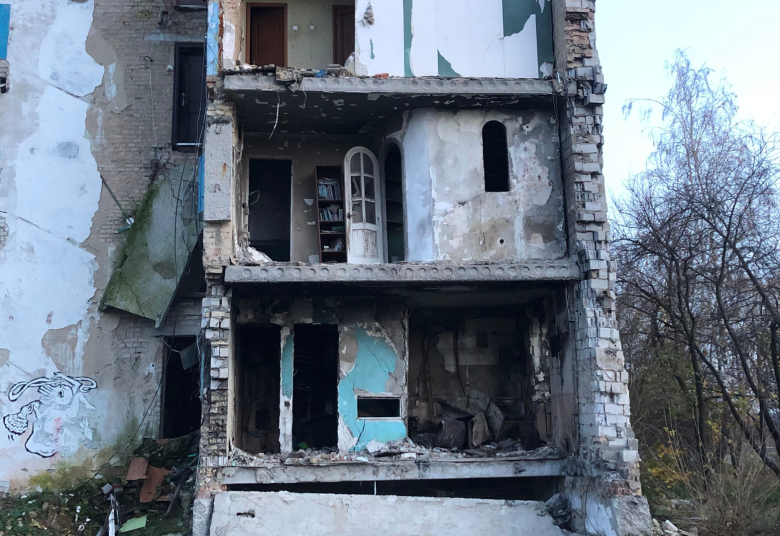
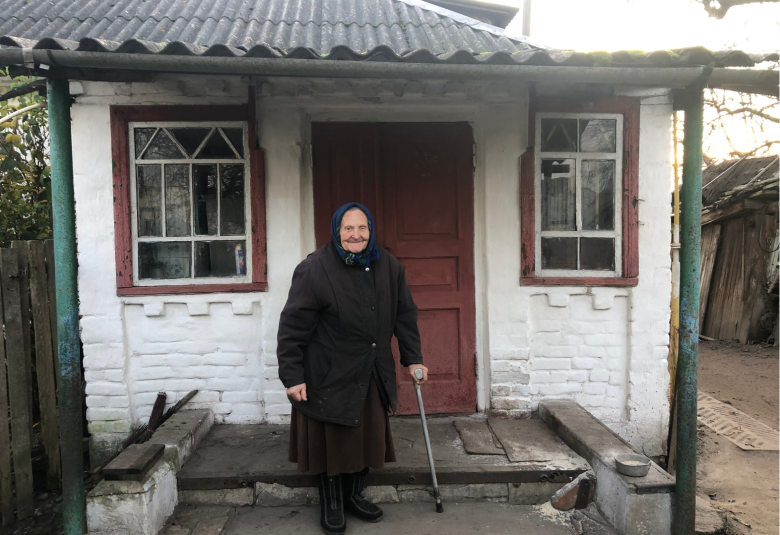
When I meet families in Ukraine who have lost their homes, I see more than just the physical damage. A home is not just a building; it’s where memories are made, where children grow, and where families find comfort. Losing that is losing a part of who they are.— Orkhan Aliyev, HFHI Ukraine Chief of Party
The war has more than simply demolished homes; it has reshaped the way Ukrainians live.
Homeownership, which once stood at 95% in 2021, dropped to 79% in 2024, reflecting a dramatic increase in rental housing. However, affordability remains a challenge, with 31% of renters spending more than 70% of their household income on housing (IOM, 2024). Rental costs have skyrocketed, making it even harder for families to afford shelter. Evictions are also a growing concern, with 37% of internally displaced persons (IDPs) lacking legal documents for their current housing, making them vulnerable to displacement (IOM, 2024).
What progress has been made to accommodate those affected by war?
The government has recognized that temporary solutions – including emergency shelters, modular housing, short-term rental subsidies, and rehabilitation projects – are not enough. A systemic change is needed. The new Housing Draft Law has provided both a legal foundation and the introduction of a comprehensive housing strategy that could finally provide long-term solutions to the crisis. This new approach seeks to modernize outdated housing legislation, replacing the ineffective Soviet-era Housing Code (1983) with a law that reflects the realities of modern Ukraine. New policies prioritize affordable rentals, expand social housing, and introduce financial compensation mechanisms for those struggling with housing costs.
Core to this reform is the creation of a Unified Information and Analytical Housing System, a platform designed to track available housing stock, social housing needs, and financial assistance programs. The system will also allow displaced people to apply for housing support, ensuring resources are distributed efficiently and transparently.
While strategic urban planning and reconstruction efforts are underway, the challenge remains enormous. The government’s goal of ensuring access to safe, affordable housing for all Ukrainians will require significant investment, international support, and private sector involvement.
Habitat in action in Ukraine
From the onset of the war, Habitat for Humanity (HFHI) has responded to the urgent need for housing and stability by creating pathways to permanent, dignified housing for displaced and war-affected families. Drawing on decades of experience in the European region, the organization has fostered partnerships with governments, local organizations, and international agencies to address the urgent housing needs of the most vulnerable displaced and non-displaced population.
Since 2024, Habitat has provided essential winterization support to 1,082 vulnerable individuals in the Kherson and Mykolaiv regions, and non-food items (NFIs) to collective centers for 2,533 displaced individuals in the western region, hosting large numbers of displaced women with children and the elderly. In total 3,615 war affected individuals have benefited from NFIs and winterization support.
In Ukraine’s southern region, Habitat has continued to work with the Odessa Housing Union. This has included upscaling the successful program of energy efficiency modernization in multi-apartment buildings (MABs), with nearly 10 buildings undergoing energy efficiency improvements. This has resulted in 1,178 households benefiting from better heating efficiency, reduced energy costs, and improved overall comfort. The upgrades have led to a total reduction of 3,661,949.73 kWh/year in heat energy consumption, based on the heating season compared to previous years. This has contributed to a CO₂ emission reduction of 952.11 tons per year. Additionally, improvements in electrical efficiency have resulted in 69,024 kWh/year of reduced electric energy losses, further lowering CO₂ emissions by 27.9 tons per year.
In the western city of Kalush, Habitat has initiated a pilot project for longer-term rental housing for vulnerable IDPs with our Ukrainian Partner METALAB. The pilot aims to refurbish a vacant municipal building into affordable and safe rental apartments for 150 vulnerable IDPs. The housing initiative provides barrier free apartments for families with a member with a disability, communal and child-friendly spaces, and individual, long-term and dignified housing for these displaced families. This pilot also addresses the intersectoral challenges of displacement by developing a community-led housing management approach, linking with livelihoods opportunities and social services in partnership with METALAB, Co-Haty, and the Municipality of Kalush.
Moreover, throughout 2024, Habitat has provided technical expertise to the Ministerial Working Group on Housing Policy Review, advocating for inclusive, affordable, and decent housing, and influencing more equitable housing practices that include vulnerable groups in sustainable housing solutions.
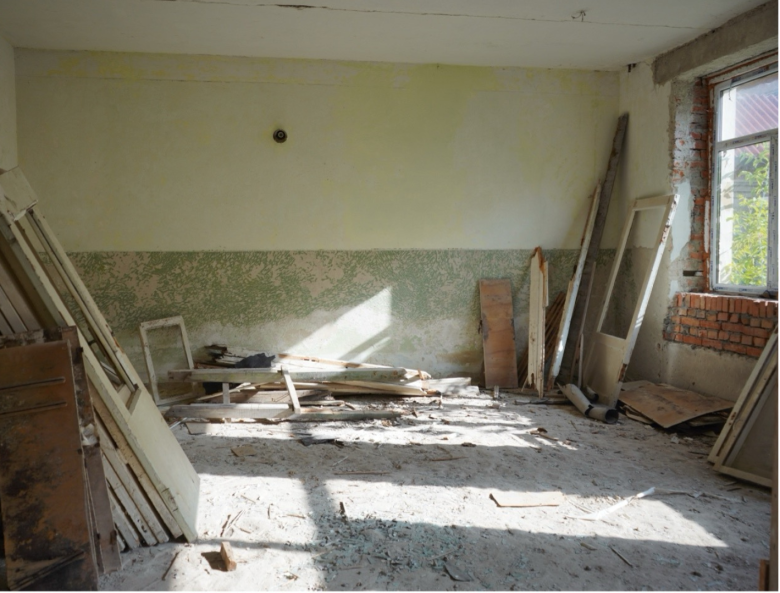
An abandoned kindergarten in Kalush is set to be transformed into a social housing project. Photo: METALAB, 2024.
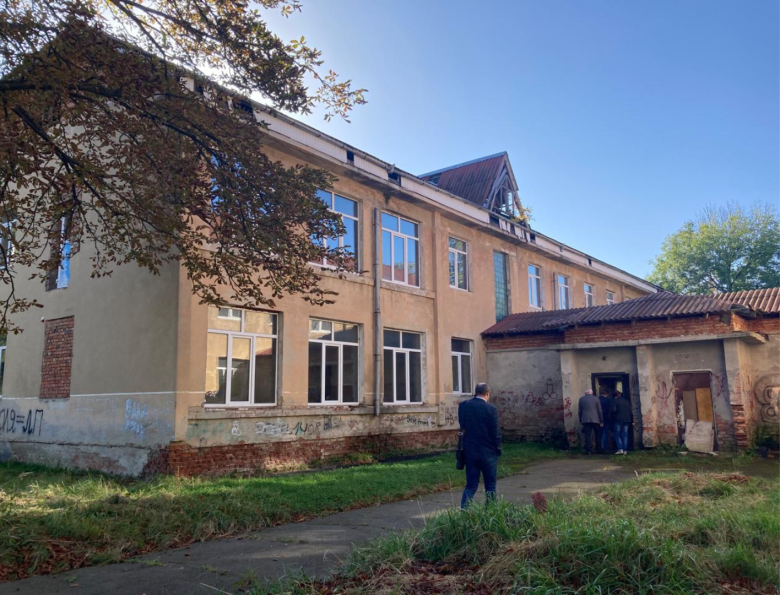
An abandoned kindergarten in Kalush is set to be transformed into a social housing project. Photo: METALAB, 2024.
HFHI’s strategic role in Ukraine’s housing recovery (2025-2030)
With its global experience in affordable housing, post-war reconstruction, and housing finance, HFHI established its office in Ukraine in 2023 and has outlined a strategy for Ukraine from 2025 to 2030, ensuring that housing recovery efforts are sustainable, inclusive, and resilient.
The strategy is built on three interconnected pillars:
1) Building More and Better Homes
2) Transforming the Housing System
3) Inspiring Action for Housing
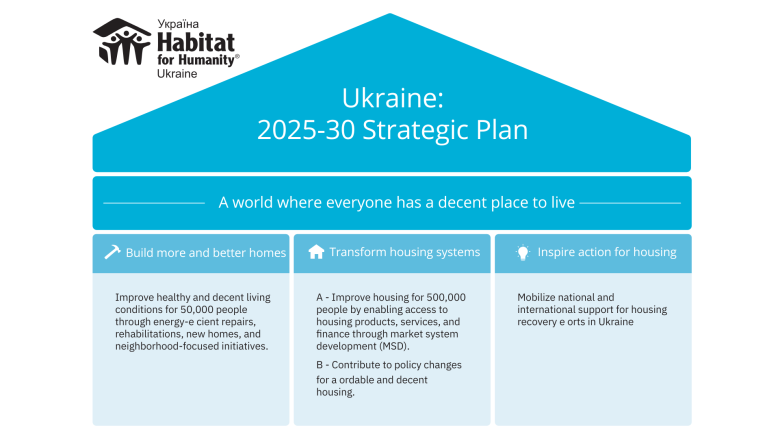
HFHI’s impact can be seen in several ways.
In the short term, transitional housing programs are providing rapid solutions for displaced families, while home repair initiatives are making partially damaged buildings habitable. Host family support programs – providing financial aid to those sheltering IDPs – are helping to stabilize communities overwhelmed by displacement.
But beyond temporary solutions, HFHI’s real contribution will be in rebuilding Ukraine’s housing sector sustainably. Through community-driven rehabilitation programs, families will receive technical guidance and financial assistance to restore their war-damaged homes. These projects will also repair multi-family apartment buildings and housing cooperatives, ensuring that the most affected neighborhoods are not left behind.
HFHI’s expertise in affordable housing finance will expand social housing stock, create rent-to-own programs, and develop micro-loans for home repairs. Working with Ukrainian banks, municipalities, and international donors, HFHI will establish housing credit schemes that made homeownership and long-term rentals attainable for displaced families and low-income households.
To build local ownership and capacity, HFHI has chosen to be a partner-led organization. By working through local governments, civil society groups, and the private sector, we aim to scale our impact by leveraging existing housing initiatives, ensuring sustainability through market-driven housing solutions, and enhancing policy advocacy by collaborating with state actors on housing legislation reforms. HFHI aims to support the government in developing clear strategies for social housing expansion, urban planning reforms, and fair land allocation for housing projects. Additionally, we will push for legal protection for IDPs and returnees, ensuring their rights to property and fair rental conditions.
Behind every number is a story—a grandmother who can’t leave her damaged home because she has nowhere else to go, a child who misses their bedroom and their toys, a family living in a single room because it’s all they can afford. These are the people we’re fighting for, and their stories remind us why this work matters.— Orkhan Aliyev, HFHI Ukraine Chief of Party
Conclusion
While the war has exposed the vulnerabilities of Ukraine’s housing system, it has also pushed forward long-overdue reforms. Rebuilding an entire housing sector in a war-torn country requires more than money; it requires commitment, coordination, and long-term vision. But as reconstruction efforts gain momentum, Ukraine’s cities – once reduced to rubble – can emerge stronger and more resilient to future shocks.
By working in partnership with local and international stakeholders, HFHI is not only restoring homes but restoring hope, dignity, and a future in which every Ukrainian has a place to call home.

